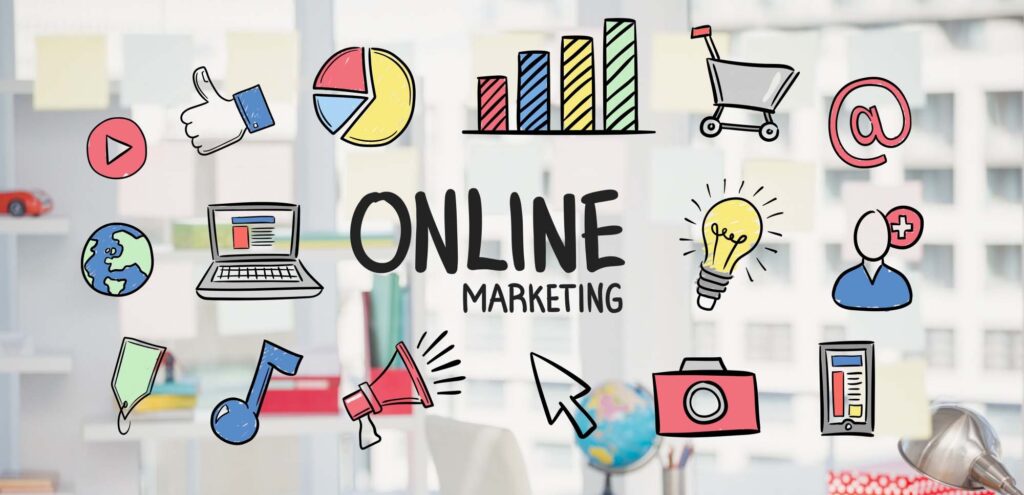In today’s ever-evolving digital landscape, the rise of Artificial Intelligence (AI) has emerged as a game-changer in the realm of marketing. With its ability to analyse vast amounts of data and make intelligent decisions, AI is revolutionizing the businesses connect with their customers and optimize their marketing strategies.
At its core, AI is the simulation human intelligence in machines that are programmed to think and learn like humans. In the context of marketing, AI is used to gather, process, and interpret customer data, leading to more personalized and proactive marketing campaigns.
The current impact of AI in digital marketing is already evident, and its potential benefits are truly astounding. By leveraging AI technology, businesses can gain a deeper understanding of their target audience, predict consumer behaviour, automate marketing tasks, and ultimately create more impactful and efficient marketing strategies.
AI Applications in Digital Marketing
Personalization and Customer Segmentation
One of the significant areas where AI makes a profound impact is in personalization and customer segmentation. With the help of machine learning algorithms, businesses can tailor their marketing campaigns to specific individuals or customer segments, ensuring that the right message reaches the right audience.
Customized content delivery is a key component of enhancing customer engagement. By analysing user data, AI can determine an individual’s preferences, interests, and buying patterns to deliver content that resonates with them. This level of personalization fosters stronger connections between businesses and customers, leading to increased loyalty and higher conversion rates.
Predictive Analytics and Behaviour Analysis
AI-driven predictive analytics is a powerful tool that enables businesses to better understand consumer preferences and anticipate their behaviour. By analysing vast amounts of data, AI algorithms can detect patterns and trends, providing valuable insights into customers’ future actions.
Armed with this knowledge, businesses can optimize their marketing strategies to align with their customers’ preferences. For example, AI can predict when a customer is likely to make a purchase and suggest tailored offers or discounts at the optimal time, maximizing the chances of conversion.
Chatbots and Virtual Assistants
AI-powered chatbots have revolutionized customer support by providing instant and efficient solutions. These virtual assistants use natural language processing algorithms to understand and respond to customer queries, providing a seamless user experience.
Beyond customer support, chatbots and virtual assistants can also streamline user experiences by offering personalized recommendations and suggestions. By analysing user behaviour and preferences, AI can anticipate and provide valuable content or product recommendations that align with individual needs, facilitating smoother user journeys.
AI-Driven Marketing Automation

Automation is a hallmark of AI, and there are multiple ways it is transforming marketing processes. By automating repetitive tasks, AI enables marketers to focus on strategic initiatives and creative endeavours.
One example is optimizing ad targeting and budget allocation. With AI algorithms, businesses can identify the most relevant and high-value audience segments for their ads, ensuring maximum reach and impact. Additionally, AI can dynamically allocate ad budgets to the most effective channels in real-time, optimizing the ROI of marketing campaigns.
AI also plays a crucial role in streamlining email marketing campaigns. By automating the creation and sending of personalized email content, businesses can nurture leads and engage existing customers more effectively. AI can analyse customer data to determine the most suitable content for each individual, resulting in higher open rates, click-through rates, and conversions.
AI-Powered Content Creation and Curation
Content creation and curation are time-consuming tasks that can be significantly streamlined with the help of AI. Natural language processing (NLP) algorithms enable AI to generate personalized content that aligns with individual preferences and interests.
AI-driven content curation is another powerful application. By analysing user data and behaviour, AI can curate and recommend relevant content from various sources, ensuring that businesses provide value to their audience consistently. This not only saves time for marketers but also enhances content marketing efforts by delivering the right content to the right people at the right time.
Ethics and Challenges in AI Marketing
While the potential of AI in marketing is vast, it is crucial to ensure responsible and ethical practices. Transparency, privacy, and data security are paramount considerations in the deployment of AI technologies.
To avoid biases and discrimination, it is essential to carefully design and train AI algorithms. By incorporating diverse datasets and actively monitoring for biases, businesses can strive for fairness and equal treatment in their AI-driven marketing initiatives.
Though AI automation is powerful, human oversight remains crucial. Continuous monitoring and validation of AI-generated insights are necessary to maintain ethical practices and ensure that customer experiences are not compromised.
Future Trends and Innovations

The future of AI in digital marketing holds exciting possibilities. Voice search and AI-driven SEO strategies will continue to gain prominence as conversational interfaces become more prevalent. Businesses that optimize their websites and content for voice searches will have a competitive edge, reaching a broader audience and providing seamless user experiences.
Augmented reality (AR) and virtual reality (VR) are also set to transform AI marketing. These technologies will enable businesses to create immersive experiences for their customers, allowing them to interact with products or services in a virtual environment. AI algorithms will enhance these experiences by personalizing and adapting the content based on user preferences, leading to higher engagement and conversion rates.
Additionally, the integration of AI-powered influencer marketing and social media strategies will enable businesses to identify the most influential individuals and target them strategically. AI algorithms can analyse vast amounts of social media data to identify trends, sentiment, and engagement levels, helping businesses optimize their influencer marketing efforts and forge stronger connections with their target audience.
Case Studies: Successful AI Integration in Digital Marketing
Several industry giants have successfully leveraged AI in their digital marketing strategies, achieving remarkable results:
A. Amazon’s AI-driven product recommendations: By analysing user browsing history and purchase behaviour, Amazon’s AI algorithms make personalized product recommendations, significantly boosting sales and customer satisfaction.
B. Netflix’s AI-powered personalized content suggestions: Netflix’s AI algorithms analyse user preferences, watching habits, and ratings to curate and recommend TV shows and movies that align with individual interests, enhancing user engagement and retention rates.
C. Spotify’s AI algorithms for customized music recommendations: With its AI-powered recommendation engine, Spotify analyses users’ listening habits, genre preferences, and social interactions to create customized playlists and suggest new music, creating a highly personalized music streaming experience.
Benefits and Limitations of AI in Digital Marketing
A. Advantages of AI in enhancing customer experiences and engagement:
- Personalized marketing campaigns that resonate with individual customers
- Tailored content delivery for a more engaging user experience
- More accurate predictions of consumer behaviour, leading to better-targeted strategies
- Automation of repetitive tasks, allowing marketers to focus on strategy and creativity
B. Limitations and potential risks associated with AI in marketing:
- Data privacy concerns and potential security breaches
- The need for ongoing human oversight to ensure ethical practices
- The potential for biases and discrimination in AI algorithms
- The possibility of over-reliance on AI, neglecting the human touch and empathy
Summary and Conclusion
In conclusion, the power of AI in digital marketing is undeniable. With its ability to personalize marketing campaigns, predict consumer behaviour, automate tasks, and create efficient strategies, AI serves as a catalyst for transformative growth.
Businesses across industries must embrace AI technologies to stay competitive in this ever-evolving digital landscape. By harnessing the potential of AI, organizations can deliver tailored experiences, nurture customer relationships, and drive business success.
FAQ
A. What is the role of AI in digital marketing?
AI plays a crucial role in digital marketing by enabling personalization, predictive analytics, automation, and content creation. It empowers businesses to connect with their target audience in more meaningful ways and optimize their marketing strategies for maximum impact.
B. How can AI enhance customer personalization in marketing?
AI analyses customer data to understand preferences, behaviours, and buying patterns. With this knowledge, businesses can tailor marketing campaigns and content to provide highly personalized experiences, leading to increased customer engagement and loyalty.
C. What are the potential risks and concerns with AI in marketing?
Potential risks include data privacy issues, security breaches, biases, and discrimination. It is crucial for businesses to ensure transparency, ethical practices, and human oversight to mitigate these risks and foster trust with customers.
D. Can AI completely replace human marketers?
While AI can automate repetitive tasks and provide valuable insights, human marketers still play an essential role. Human creativity, empathy, and strategic decision-making cannot be replaced by AI. Rather, AI augments human capabilities and enables marketers to focus on higher-level initiatives.
E. How can businesses integrate AI into their digital marketing strategies?
Businesses can integrate AI into their digital marketing strategies by leveraging AI tools and platforms for data analysis, personalization, automation, and content creation. It is crucial to set clear objectives, carefully design AI initiatives, and continuously monitor and optimize them for maximum effectiveness.
- AI Applications in Digital Marketing
- AI-Driven Marketing Automation
- AI-Powered Content Creation and Curation
- Ethics and Challenges in AI Marketing
- Future Trends and Innovations
- Case Studies: Successful AI Integration in Digital Marketing
- Benefits and Limitations of AI in Digital Marketing
- Summary and Conclusion
- FAQ

Exploring The Power of AI in Digital Marketing: The Future is Now